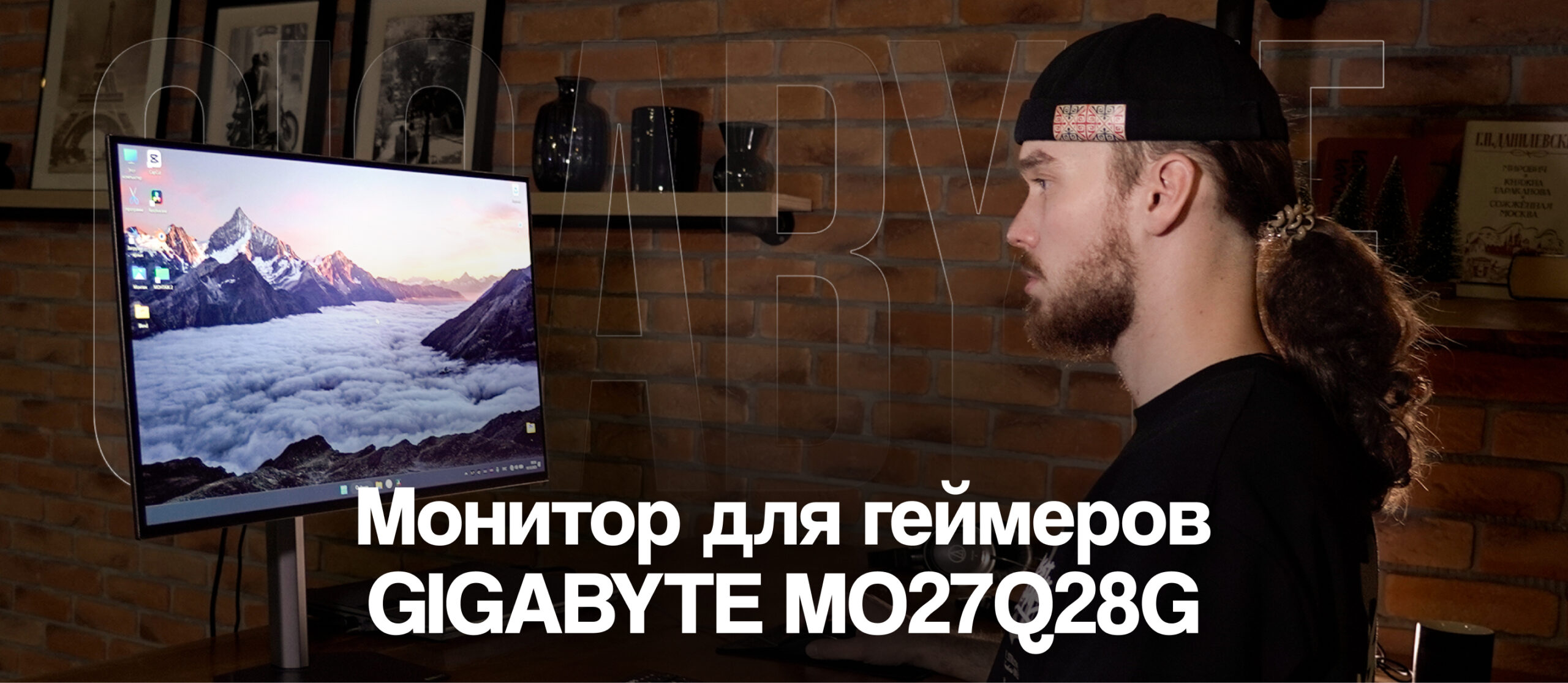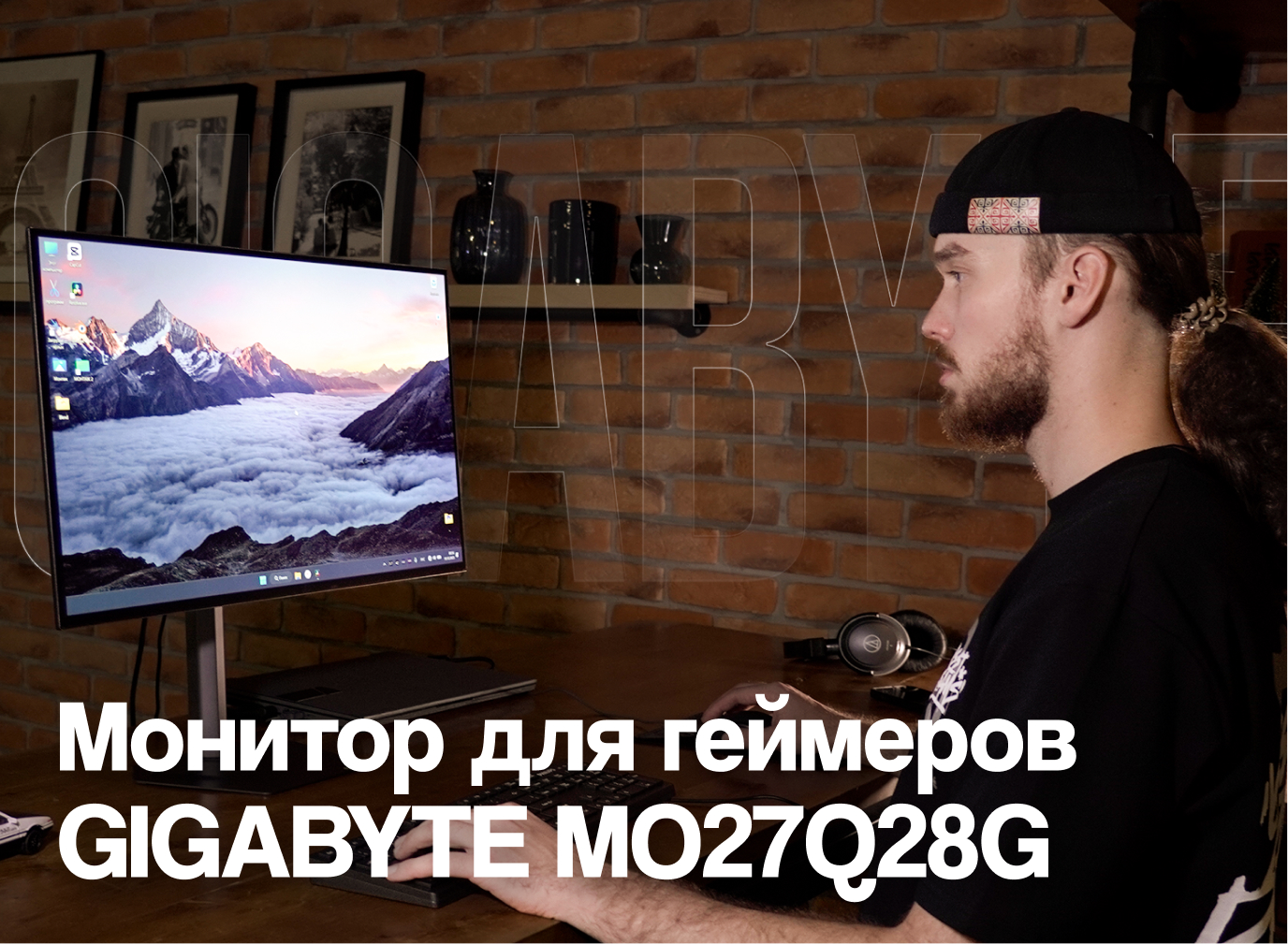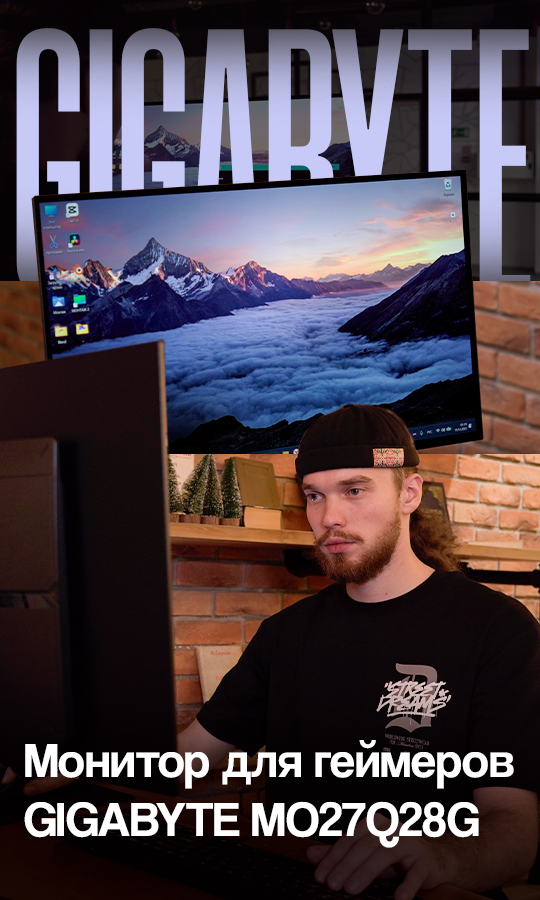Kazakhstani entrepreneurs are increasingly aiming to build not just commercially successful enterprises but also social projects where businesses contribute to solving societal challenges. One such example is the domestic IT company KAZ ITECH, which specializes in developing commercial software and has launched two social startups in the fields of education and healthcare. The iU test platform is designed to bridge the knowledge gap between urban and rural students, while Ai CARD utilizes neural networks to assist doctors in diagnosing heart diseases. In an interview with Er10.media, Dastan Mukhamediyev, CEO of KAZ ITECH, shared the startups' missions, plans, and future prospects.
Follow Kazakhstan’s Startup Movement in the "100 Startup Stories of Kazakhstan", a collaborative project by ER10 Media and Astana Hub. This initiative highlights the most innovative Kazakh startups, showcasing projects that stand out for their creativity and impact. Among the heroes are Astana Hub residents, as well as creators of other innovative technological products and services. The content is available in Kazakh, Russian, and English.
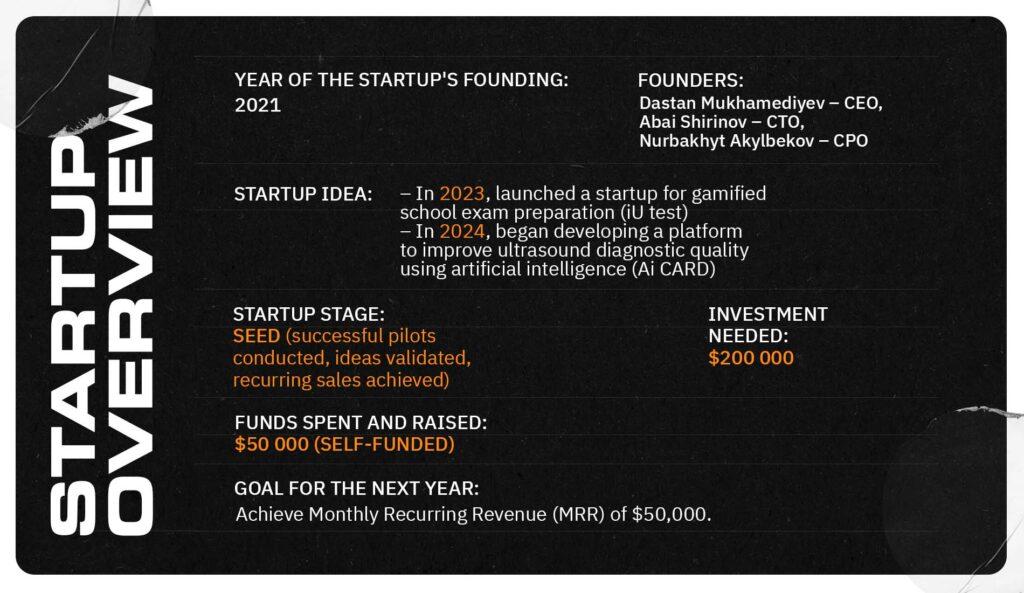
Successful business goes to a startup
– How did you come up with the idea to launch two startups?
– Our case is not quite ordinary. Let me explain step by step. Three years ago, we founded the IT company KAZ ITECH. It was established by three people: I serve as the founder and CEO, while Abai Shirinov is our CTO and Senior Full-Stack Developer, and Nurbakhyt Akilbekov is our CPO and Senior Product Manager.
Our company specializes in software development, including web and mobile applications. To date, we’ve successfully completed over 30 projects. Among our clients are the Ministry of Defense of Kazakhstan, the Ministry of National Economy, Kazakhstan Railways (KTZ), Kazatomprom, regional akimats, and many others. This year, we secured a major contract with ERG. As part of the project, we are digitizing one of their factories, implementing a digital queuing system, and later scaling these tested technologies to other factories. What makes our company unique is our comprehensive approach. We don’t just develop and implement IT products; we focus on restructuring business processes, solving underlying problems, and integrating digital solutions to improve efficiency.
Social Startup in Education
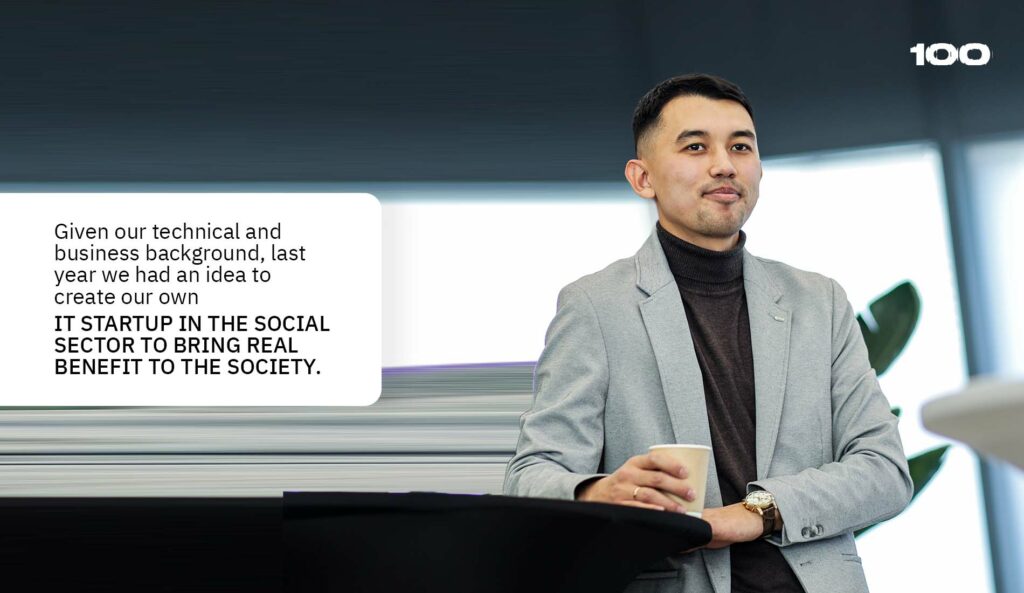
– As leaders of a successful IT company, why did you decide to explore something new?
– Yes, given our technical and business background, last year we had an idea to create our own IT startup in the social sector to bring real benefit to the society. We decided to launch an educational platform to help students prepare for the Unified National Test (UNT). We prioritized gamification, knowing that preparing for exams can often be tedious and boring. By integrating gamified elements, we aimed to motivate students to study more effectively. Another issue we sought to address is educational inequality. It’s no secret that students from rural schools often have weaker preparation compared to their urban peers. Our goal was to bridge this gap with our platform.
Development of the iU test educational service began last fall, and it was launched by spring 2024. We received support and promotion assistance from Kundelik.kz. This partnership allowed our platform to reach students, teachers, and parents alike. Within just two months, 8,000 users registered on the platform, with 200 opting for paid subscriptions — all achieved without a dedicated sales or marketing team. Over the summer, we focused on developing a mobile application. Currently, we are working on partnerships with school networks such as iQanat, BINOM, and others. We believe it’s more efficient to onboard an entire school with a thousand students than to acquire a thousand students individually.
Currently, we are working on partnerships with school networks such as iQanat, BINOM, and others. We believe it’s more efficient to onboard an entire school with a thousand students than to acquire a thousand students individually.
Additionally, we are seeking investments to scale the project. The exam preparation market is highly competitive and requires significant resources for promotion, advertising, and sales. So far, we’ve funded the project ourselves while continuing our primary business operations. Now, we believe it’s time for iU test to have its own dedicated team.
– How much funding do you require?
– Approximately $150,000.
– What feedback has iU test received?
– We have received positive feedback from both teachers and students. The platform has an excellent UX/UI, with well-designed features and content. Additionally, we’ve partnered with an educational center that develops tests, which provided us with the necessary methodology. The only feature currently missing from the platform is adaptive learning. Every student needs a mentor or assistant to guide and motivate them. We aim to implement this functionality using AI.
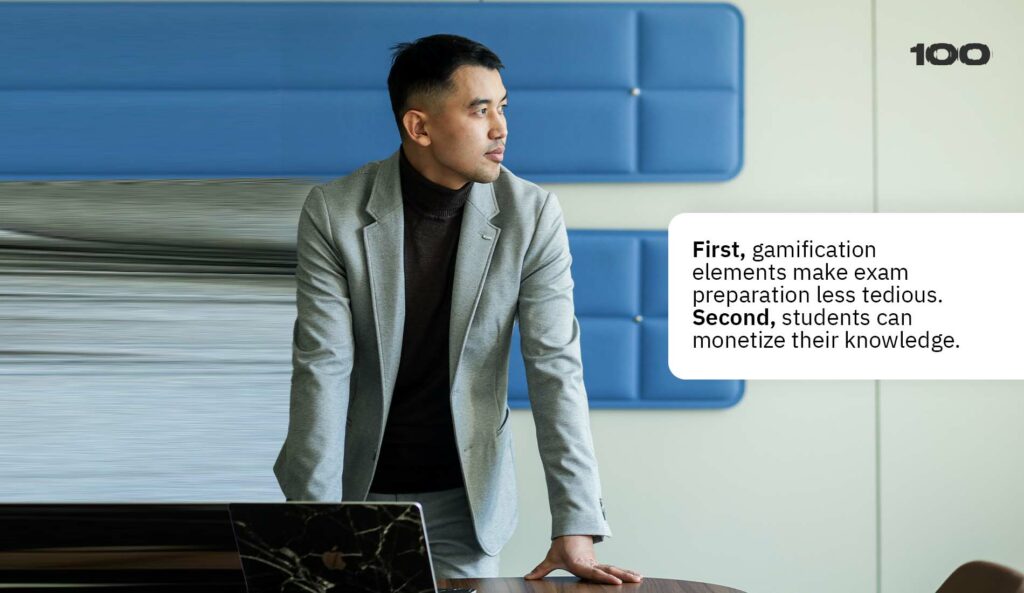
– You mentioned that your startup operates in a highly competitive environment. What sets you apart, and how do you plan to stay ahead of the competition?
– First, gamification elements make exam preparation less tedious. Second, students can monetize their knowledge. For successfully completing tests, we generate virtual currency that can be exchanged for valuable prizes or even withdrawn. Third, we take a more comprehensive approach to learning. Many competitors focus solely on test tasks, claiming that their questions are relevant and guaranteed to appear on exams, encouraging students to memorize them. On our platform, each test is tied to a specific topic. When a student makes a mistake, we identify the topic they are struggling with. Our platform includes a large library of study notes, allowing students to prepare and take targeted tests on those specific topics. Essentially, we identify gaps in knowledge and help students close them.
– What monetization model does iU test use?
– Freemium. The basic content is offered for free, but access to advanced features requires a paid subscription.
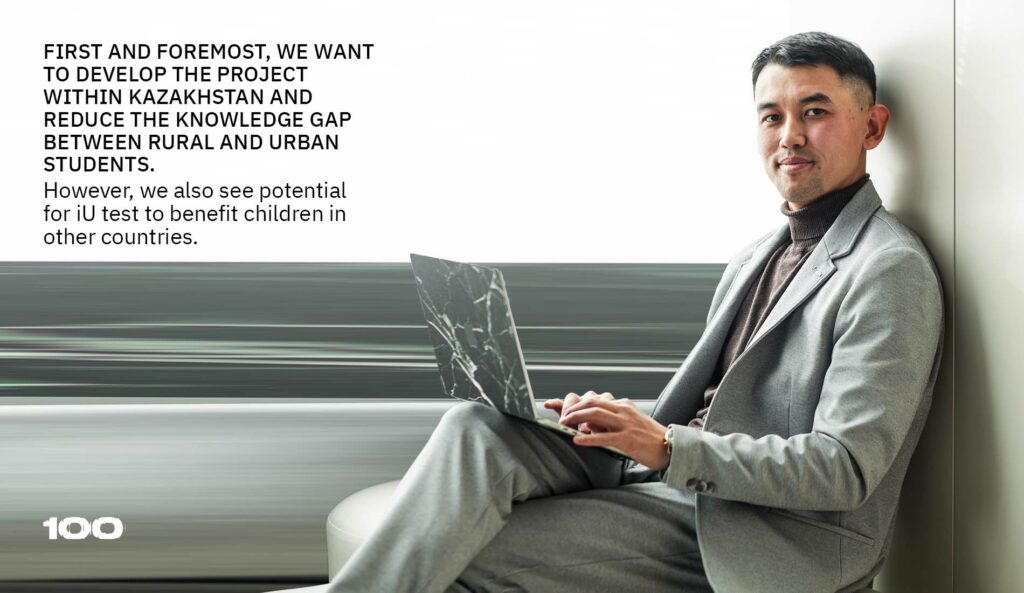
– Are you planning to scale iU test to other markets?
– First and foremost, we want to develop the project within Kazakhstan and reduce the knowledge gap between rural and urban students. We were born and raised in villages ourselves, so we understand the seriousness of this issue. However, we also see potential for iU test to benefit children in other countries. We’ve analyzed markets in the CIS, Eastern Europe, Turkey, and India. Our platform can enter markets with similar knowledge assessment systems, specifically those that rely on mass testing.
Social Startup in Healthcare
– Tell us about your medical startup, Ai CARD.
– By chance, I had the opportunity to meet a team of some of Kazakhstan’s best cardiac surgeons working at the National Research Cardiac Surgery Center in Astana. Together, we decided to combine their industry expertise with our technical background to create a MedTech project. The idea was to develop an artificial intelligence-based model that could improve diagnosis in cardiac ultrasound. The challenge lies in the fact that the heart is constantly in motion, making its ultrasound one of the most complex types of diagnostics.
Initially, we faced difficulties starting the project because our team lacked AI specialists. At that time, Astana Hub launched the AI'preneurs acceleration program, aimed at bringing together entrepreneurs and developers in the AI field. We applied, were accepted, and met ML engineer Shaigazy Mukhtarov, who joined the project. In September, we began development in collaboration with the team of cardiac surgeons and created an MVP. By November 2024, we successfully conducted pilot testing at a hospital in Astana, receiving positive feedback and a set of tasks for further refinement.
We are now refining the project and have reached agreements with the National Research Cardiac Surgery Center and Astana Medical University. Their specialists have joined our team, and together we are implementing the project. We have also attracted the interest of global accelerators such as Antler and Plug & Play, which are ready to welcome us next year.
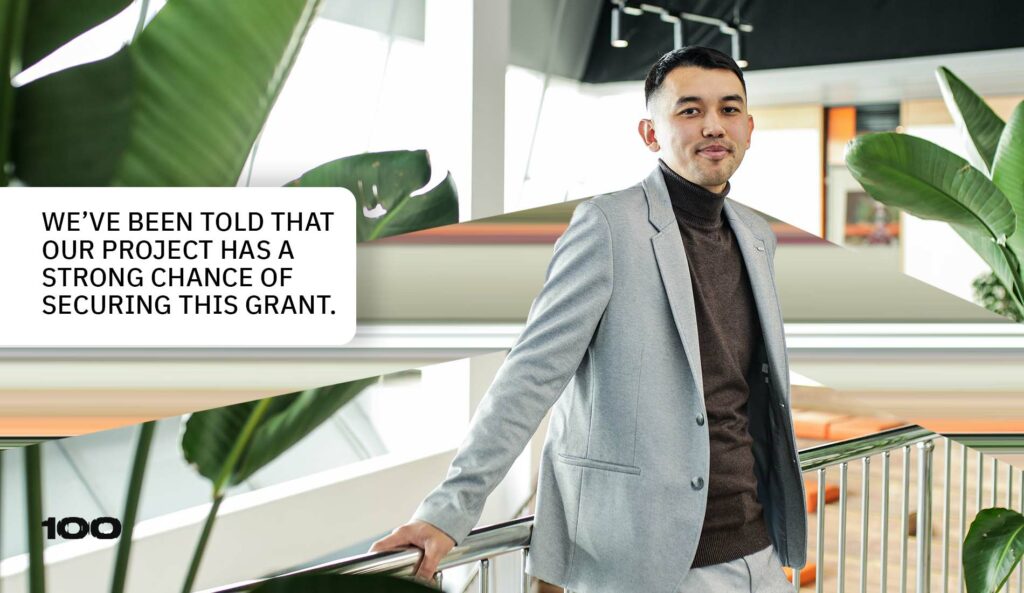
– Are there any challenges in implementing the project?
– Ai CARD is a medical project, and selling such technology to state hospitals is difficult due to the many bureaucratic hurdles involved. The case of Cerebra demonstrated this clearly. That’s why we decided to take a different approach. Early next year, we plan to apply for a grant from the Science Fund, which offers up to 300 million tenge. We’ve been told that our project has a strong chance of securing this grant. This funding would allow us to focus fully on the project without worrying about finding additional resources.
– Which markets are you planning to scale Ai CARD to?
– I’m acquainted with Cerebra founder Doszhan Zhussupov, who advised against entering foreign markets without a pilot, traction, and proven practical benefits in our own country. Therefore, our priority is to refine the technology in Kazakhstan, gather data to train the AI model, and achieve solid results. I believe this will take about two years. We’re hopeful about receiving the grant, which will enable us to dedicate ourselves to this effort.
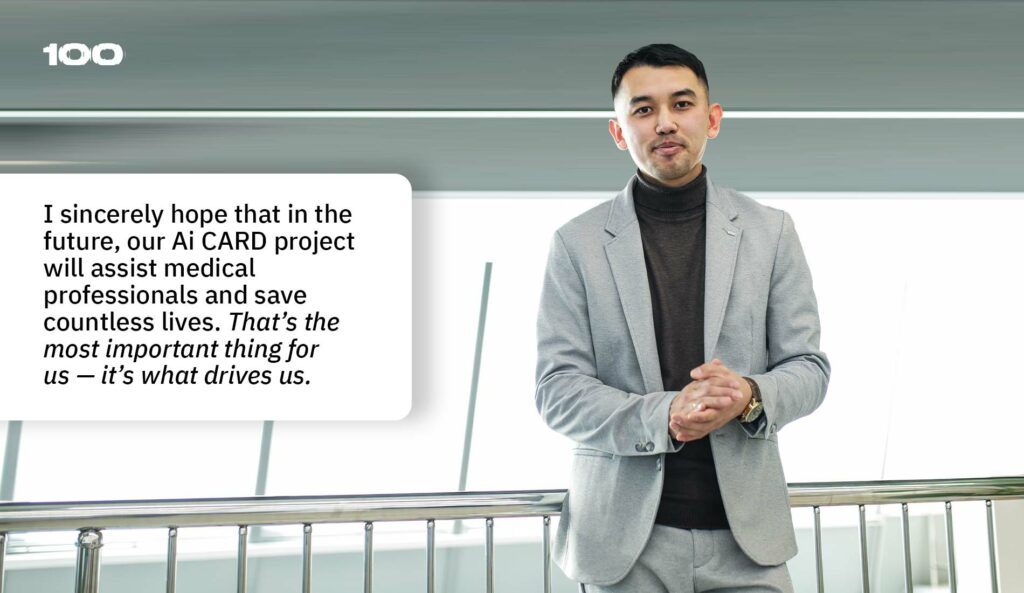
When it comes to scaling, our focus will be on emerging markets such as MENA, Southeast Asia, and Africa, where access to highly qualified medical personnel is often limited. Ai CARD can become an essential tool for improving diagnostic accuracy and enhancing the quality of healthcare. In developed markets, doctors have more resources and experience, reducing the need for an AI assistant like ours.
I sincerely hope that in the future, our Ai CARD project will assist medical professionals and save countless lives. That’s the most important thing for us — it’s what drives us.
The Desire to Benefit Society
– Is it important to you that your startups make a positive impact?
– Yes, when you have a global mission and a meaningful goal, when your actions can benefit a large number of people, it’s incredibly motivating. It gives you strength and unites the team.
– Did accelerator programs help you?
– Yes, we participated in two acceleration programs by Astana Hub, which greatly enhanced our team. For the educational project, we joined Startup Garage. For the medical project, we went through the AI'preneurs program.
– How did you get into entrepreneurship?
– I started in the public sector, working in ministries and national companies. Later, I transitioned to the private sector. Eventually, I met my co-founders, and we decided to start our own IT company.
– What inspires you in your work? Books, movies?
– A book that changed my perspective is Good to Great by Jim Collins. It emphasizes the importance of “who” over “what,” meaning the team is paramount. If the team is strong, it will succeed and accomplish any task. That’s why my team motivates me. Of course, my family is also a huge source of inspiration. Even though I’m deeply passionate about business and need to stay “in the zone” 24/7, my family remains the top priority. They are my motivation, my energy source, and my inspiration.

– If you were to compare your entrepreneurial spirit to a sport, what would it be?
– I practiced boxing for many years and even earned a Candidate Master of Sport (CMS) title. The first thing you learn in sports is discipline, and that skill is invaluable in business. No matter how talented or professional you are, without discipline, you won’t achieve anything. I also love chess. Right now, I’m playing an online match with Timur Turlov.
– Do you enjoy being an entrepreneur?
– Honestly, I was well-paid in national companies, but I felt a deep sense of dissatisfaction because I had no real influence over processes and couldn’t realize my potential due to bureaucracy. Entrepreneurship is an environment where you can unlock your potential and make the world a better place.



